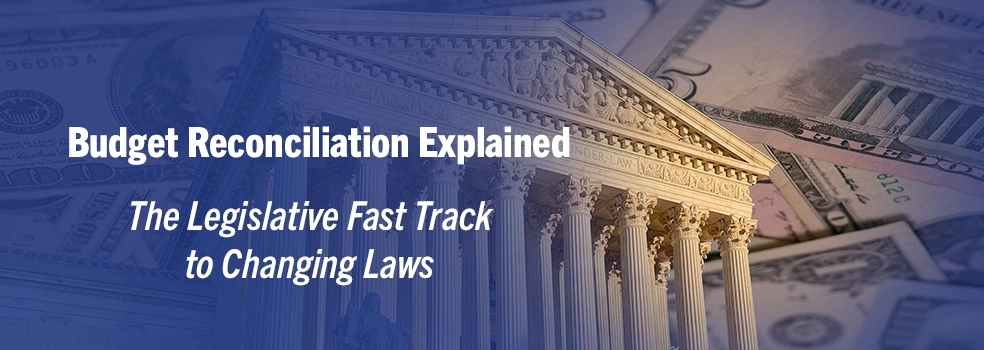
Major congressional legislation often faces a seemingly insurmountable roadblock: the Senate filibuster. However, there is a special legislative process that allows Congress to bypass this obstacle for certain fiscal legislation—budget reconciliation. This mechanism enables lawmakers to implement dramatic fiscal policy shifts, whether raising or slashing taxes, or substantially expanding or reducing government expenditures.
Because some of the areas under consideration for federal funding cuts are focused on Medicaid, telehealth, the workforce, and other issues that may impact mental health care and the counseling profession, understanding this legislative process and any potential implications may be helpful to counselors.
What Is Budget Reconciliation?
Created by the Congressional Budget Act of 1974, reconciliation provides a fast-track procedure for legislation affecting taxes, spending, or the debt limit. Its most significant feature? In the Senate, reconciliation bills aren’t subject to filibuster, meaning they can pass with a simple majority (51 votes, or 50 plus the vice president’s tie-breaking vote) rather than the 60 votes typically needed.
The budget reconciliation process is separate from annual appropriations, which fund federal agencies and discretionary programs. Reconciliation can address most “mandatory” spending programs (Medicare, Medicaid, SNAP, farm programs), though it cannot modify Social Security.
The process begins when Congress adopts a uniform budget resolution containing “reconciliation directives” for specific committees in the House and Senate. These directives set overall targets for spending increases/decreases, revenue changes, or debt limit modifications, without specifying how to reach those targets. According to congressional rules, the Senate and House cannot move forward with the overall budget reconciliation process until both chambers adopt the same budget resolution language.
Historical Use and Evolution
Since 1974, Congress has enacted 23 reconciliation bills. Early reconciliation bills (1980s–1990s) typically reduced deficits and passed with bipartisan support. More recently, reconciliation has been used to advance partisan priorities like tax cuts (2001, 2003, 2017) and COVID-19 relief (2020, 2021).
The Senate and the House passed identical budget resolutions in early April, unlocking the next stage in the reconciliation process where congressional committees will begin to develop specific recommendations on tax rates and spending levels for programs (e.g., federal health care spending over a period, typically 10 years).
The reconciliation process will likely have far-reaching fiscal implications. It directs the House Energy and Commerce Committee to cut $880 billion in spending, a move that, according to the Congressional Budget Office, will likely impact the Medicaid program, potentially leading to millions of enrollees losing their coverage beginning in 2026. According to provisions in the budget resolutions, the House must identify at least $1.5 trillion in spending cuts that will impact several health programs.
Potential Implications for Counselors
Medicaid funding cuts: Spending reductions would likely decrease access to mental health services to Medicaid enrollees and affect counselor reimbursement, as Medicaid is a major payer for these services.
Health care delivery changes: Funding modifications could shift mental health service delivery from fee-for-service to alternative payment approaches.
Workforce impact: Reduced mental health program funding could lead to job losses or reduced hours for counselors in publicly funded settings.
Access barriers: Higher out-of-pocket costs or reduced coverage may cause patients to discontinue treatment or reduce session frequency.
Administrative burden: New funding mechanisms may increase paperwork and compliance requirements.
Telehealth uncertainty: Pandemic-era provisions expanding mental health service access could face changes.
State-level impacts: Reductions in federal funding typically strain state budgets, creating challenges in compensating for Medicaid shortfalls when Congress implements restrictive measures like per-capita limits or block grants. These financial constraints may also compromise state regulatory bodies and professional development resources.
Advocacy opportunities: Counselors can highlight to their members of Congress mental health care’s cost-effectiveness, economic benefits for the workforce, and potential to reduce overall health care costs.
In addition to key congressional committees that have jurisdiction over health programs like the House Energy and Commerce Committee, the Senate and House budget committees will play significant roles in moving reconciliation bills forward. Committees will begin their work in early May.
NBCC will track the reconciliation process and identify committee proposals impacting Medicare, Medicaid, and other public insurance programs, as well as initiatives affecting the Centers for Medicare & Medicaid Services (CMS), the Substance Abuse and Mental Health Services Administration (SAMHSA), and other agencies that fund mental health services.